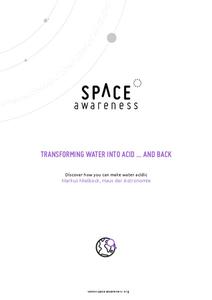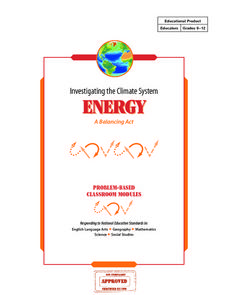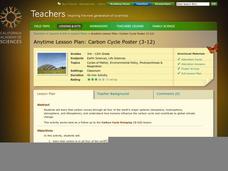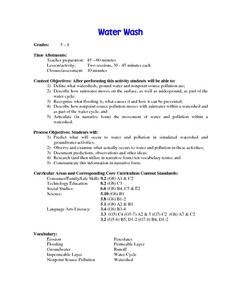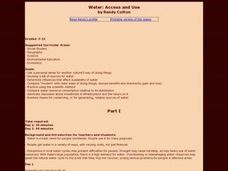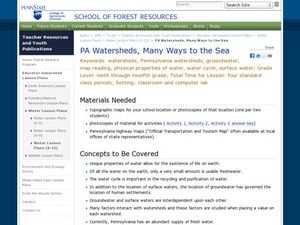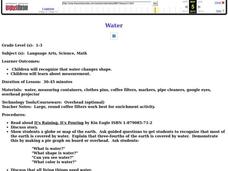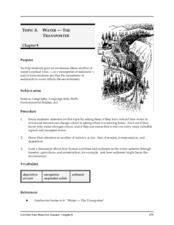Curated OER
Ecological Cycles Part 1
Knowing about the hydrologic cycle is the first step to understanding the carbon cycle. Upper graders discuss the earth's water content, polar ice caps, and the concept of the ecological cycle as it applies to carbon, nitrogen, and other...
Consortium for Ocean Science Exploration and Engagement (COSEE)
Life Cycle of Blue King Crabs
The blue king crab and the red king crab live in the same range but never in the same region. The third lesson in the series of five focuses on the blue king crab and the impact the changes in water temperature is having on its habitat....
Space Awareness
Transforming Water Into Acid ... And Back
Greenhouse gases affect marine wildlife in life-threatening ways. Through experimentation, your classes explore the acidification of water from the main greenhouse gas carbon dioxide. As they introduce carbon dioxide to water, a pH...
Curated OER
The Potential Consequences of Climate Variability and Change
Students analyze the impact of climate variability and change utilizing a broad span of topics over a wide range of grade levels. This three lesson unit is easily adapted for the various instructional levels listed.
Curated OER
Investigating the Climate System: Energy, A Balancing Act
Earth science explorers design an experiment to demonstrate that the albedo of a surface affects its temperature. They test to find out if moisture on the surface affects temperature. They discover whether or not concrete or asphalt heat...
Curated OER
Mealworms
Crawl into the world of the darkling beetle with this scientific investigation. Watch as the insects move through the larval, pupal, and adult stages of life, recording observations along the way. Discuss the necessities of life as young...
Curated OER
Acid Rain
Create a simulation of acid rain in your classroom with lemon juice and bean plants to help kids study the effects of pollution on plants. In addition, learners will listen to a story and write responses based on guiding questions.
Curated OER
Fueling Extreme Weather
First graders identify the different stages in the hydrologic cycle. To study earth science, they investigate how sunlight affects the earth's temperature. They also discuss how the sun's energy is transformed.
California Academy of Science
Carbon Cycle Poster
Humans can have a big impact on the environment, specifically the influence they have on the carbon cycle. First, the class will define and discuss each of the earths four major spheres, the biosphere, hydrosphere, atmosphere, and...
Curated OER
Water Wash
Students define watersheds, ground water and nonpoint source pollution. They describe how rainwater moves on the surface, as well as underground, as part of the water cycle. They recognize what flooding is as well as its causes.
Curated OER
Water: Access and Use
Students get a personal sense for another culture's way of doing things. Develop a list of sources for water. Practice using the scientific method. Examine means for conserving, or for generating, reliable sources of water.
Curated OER
Water and Ice
Students perform experiments in pairs to visualize the changes in water during freezing and melting. For this properties of water lesson, students use their senses and inquiry tools to understand the changes in state of water. Suggested...
Curated OER
Water
Learners learn about the history of Indiana's water and understand how easily pollution can contaminate the water supply. They also learn how little fresh water we have and how important it is to protect it.
Curated OER
PA Watersheds, Many Ways to the Sea
Learners examine the water cycle and the factors that interact with watersheds. In this watersheds activity students describe the purification process, trace the flow of infiltrate water through aquifers, and research the Internet to...
Curated OER
The Rain Cycle
Third graders draw the rain cycle. In this rain cycle lesson the students listen to the story The Legend of the Bluebonnet by Tommie DePola. As they listen to the story they sketch what is happening. The students write a sentence for...
Curated OER
Water
Students complete activities to examine the properties of water. In this water science lesson, students read a book about water's forms and study a map or globe of the Earth to investigate water. Students discuss living things that need...
Curated OER
Water and Ice
Students study the liquid and solid states of water. In this water states lesson, students complete three experiments to study water as it cycles from a liquid state to a solid state and back. Students finish with a Venn Diagram...
Curated OER
Water 1: Water and Ice
Students explore forms that water can take. In this science instructional activity, students participate in hands-on activities that require them to change water to a solid and back to a liquid again.
Curated OER
Water and Dams in Today's World
Pupils examine the importance of dams. In this water and dams lesson, students watch a video that details historical and current information about dams and global water resources. They study how engineers design dams, how they calculate...
Curated OER
Water-Nature's Magician
Students explore the properties of water. In this science instructional activity, students conduct various experiments to discover the importance of water. Math, language arts and history activities are also included.
Curated OER
Water - The Transporter
Students discuss the role of water in transporting sediments and dissolved particles. In this interdisciplinary instructional activity, students read about how water transports sediments and changes the landscape. They complete a...
Curated OER
Water and Ice
Students observe water as it changes form. In this water lesson students observe, measure, and describe water as it changes state.
Curated OER
Water World
Students explore the various steps of the water cycle. They identify the three steps in the water cycle and how they are related. Students describe three ways to conserve water. Students explore the origin of the water source that...
Curated OER
Condensation
Students participate in the scientific process to investigate what happens to water when it evaporates by observing condensation. In small groups they observe what happens to ice in a cup, and what occurs when they hold a bowl of ice...




